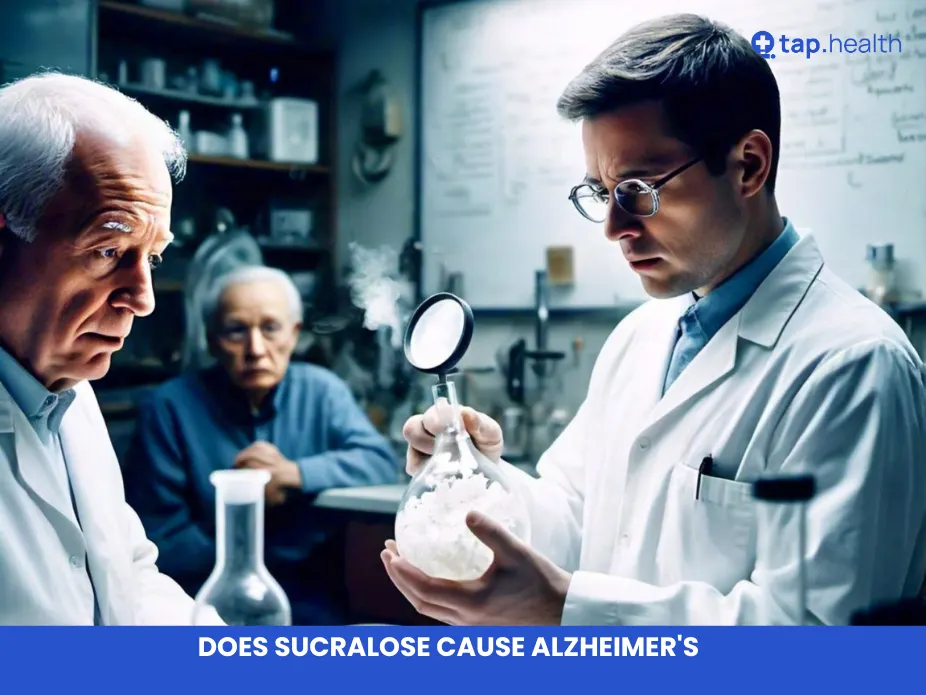Sucralose is one of the most commonly used artificial sweeteners in foods and beverages. It’s marketed as a zero-calorie alternative to sugar, making it a popular choice for people looking to reduce calorie intake or manage conditions like diabetes. However, as with many artificial sweeteners, there has been ongoing concern about their long-term health effects. One of the most frequently asked questions is: Does sucralose cause Alzheimer’s?
In this article, we will explore the relationship between sucralose and Alzheimer’s disease, delve into scientific research, and address common concerns. By the end of this post, you will have a clearer understanding of whether or not sucralose poses a risk to your brain health.
What Is Sucralose?
Sucralose is an artificial sweetener made from sugar. It’s about 600 times sweeter than regular sugar, so only a small amount is needed to achieve the same level of sweetness. Sucralose is commonly used in sugar-free products like soft drinks, chewing gum, baked goods, and even as a tabletop sweetener.
One of the key selling points of sucralose is that it is non-caloric because it is not metabolized by the body, meaning it passes through the digestive system without being absorbed for energy. Because of its sweetness and lack of calories, sucralose is a popular sugar substitute, especially for those managing their weight or blood sugar levels.
What Is Alzheimer’s Disease?
Alzheimer’s disease is a progressive neurological disorder that causes memory loss, confusion, and changes in behavior. It is the most common form of dementia, affecting millions of people worldwide. As the disease progresses, it leads to a decline in cognitive function, eventually impacting a person’s ability to carry out daily activities.
The exact cause of Alzheimer’s is not fully understood, but it is believed to result from a combination of genetic, environmental, and lifestyle factors. The hallmark features of Alzheimer’s include the accumulation of amyloid plaques and tau tangles in the brain, which disrupt normal brain function and contribute to cognitive decline.
Risk Factors for Alzheimer’s Disease
Some of the known risk factors for Alzheimer’s disease include:
- Age (risk increases with age)
- Family history and genetics (certain gene variations increase risk)
- Heart health (high blood pressure, diabetes, high cholesterol)
- Lifestyle factors (lack of exercise, poor diet, smoking, excessive alcohol consumption)
What Does Research Say About Sucralose and Brain Health?
There is a growing body of research investigating the impact of artificial sweeteners like sucralose on health, including concerns about their potential effects on the brain. Specifically, many people are worried about whether sucralose contributes to the development of Alzheimer’s disease.
However, as of now, the research on sucralose and Alzheimer’s is inconclusive, and the scientific community has not reached a consensus on whether sucralose causes Alzheimer’s disease or if it plays a role in cognitive decline.
What Studies Have Been Conducted?
1. Animal Studies on Sucralose and the Brain
Most studies investigating the potential link between sucralose and brain health have been conducted on animals, particularly rats. Some of these studies have raised concerns about the effects of sucralose on the brain, but it’s important to note that animal studies don’t always translate directly to humans.
One study published in the journal Environmental Toxicology and Pharmacology found that high doses of sucralose affected the behavior and brain activity of rats. However, these results are based on very high doses of sucralose—far higher than what a human would typically consume in a day.
2. Studies on Gut Health and Brain Function
Emerging research suggests that the artificial sweeteners we consume may affect the gut microbiome, which in turn can influence brain health. Some studies have indicated that artificial sweeteners, including sucralose, may alter the balance of gut bacteria, which has been linked to conditions like Alzheimer’s and other cognitive disorders.
However, these findings are still preliminary and much more research is needed to understand the true connection between sucralose, the gut microbiome, and brain health.
3. Research on Cognitive Function
At present, there are no definitive studies that show a direct link between sucralose consumption and cognitive decline or Alzheimer’s disease in humans. A study in the Journal of Alzheimer’s Disease did not find any evidence that artificial sweeteners, including sucralose, directly caused Alzheimer’s.
While there is some evidence that consuming large amounts of certain artificial sweeteners might have adverse health effects, the link to Alzheimer’s specifically remains unclear. It’s important to note that studies on artificial sweeteners and brain health are ongoing, and new findings may emerge in the future.
Is Sucralose Safe to Consume?
The U.S. Food and Drug Administration (FDA) has approved sucralose for use in food products, and it is generally recognized as safe (GRAS) when consumed in the amounts typically found in food and drinks. The FDA has established an acceptable daily intake (ADI) for sucralose at 5 milligrams per kilogram of body weight, which is considered safe for most people.
However, some health professionals recommend moderating the intake of artificial sweeteners like sucralose due to potential long-term health risks, such as the possible effects on the gut microbiome and overall metabolic health. People with specific health conditions, such as gut disorders, might want to limit their consumption further.
Potential Risks of Sucralose Consumption
While there is no conclusive evidence to suggest that sucralose directly causes Alzheimer’s, there are other potential risks associated with its consumption:
1. Impact on Gut Health
As mentioned earlier, some studies suggest that artificial sweeteners, including sucralose, may disrupt the balance of bacteria in the gut, which can lead to digestive issues, altered metabolism, and potential long-term health problems. The gut microbiome plays a crucial role in brain function, and any disruptions may have consequences for mental health and cognitive function.
2. Metabolic Health Concerns
Some research has raised concerns about the impact of artificial sweeteners like sucralose on insulin sensitivity and glucose metabolism. While sucralose itself doesn’t contain calories or sugar, it might still have an impact on how the body processes glucose, potentially increasing the risk of insulin resistance and type 2 diabetes—a known risk factor for Alzheimer’s disease.
3. Possible Overconsumption
Sucralose is highly sweet, which means that it’s easy to consume in large quantities without realizing it. Overconsumption of sucralose could lead to an increase in sweet cravings, potentially causing people to eat more sugary or processed foods, which could affect overall health.
Does Sucralose Cause Alzheimer’s?
The short answer is that there is no direct evidence to suggest that sucralose causes Alzheimer’s. While some studies have raised concerns about its impact on brain health and metabolism, the connection between sucralose and Alzheimer’s disease remains unproven. Much of the current research on artificial sweeteners and Alzheimer’s is still in its early stages, and further studies are needed to understand the full implications.
It’s important to remember that Alzheimer’s disease is influenced by a wide range of factors, including genetics, lifestyle, and other health conditions. While diet plays a role, it is just one piece of the puzzle.
What You Can Do to Minimize Risk
If you are concerned about the potential risks of sucralose or other artificial sweeteners, here are a few tips:
- Limit your intake of artificial sweeteners: Moderation is key. Try to reduce your consumption of foods and drinks containing sucralose.
- Focus on a balanced diet: Eating a diet rich in fruits, vegetables, whole grains, and healthy fats can help support brain health and reduce the risk of Alzheimer’s.
- Exercise regularly: Physical activity is one of the best ways to reduce the risk of Alzheimer’s and improve overall health.
- Monitor your gut health: Consider eating probiotic-rich foods (like yogurt, kefir, and fermented vegetables) to support a healthy gut microbiome.
Real-Life Scenarios
Let’s look at how some individuals navigate their use of sucralose:
- Ravi, a fitness enthusiast from Bangalore, often chooses sucralose-sweetened drinks during his workouts instead of sugary ones. He believes it helps him maintain his weight without sacrificing taste.
- Priya, a grandmother living in Delhi diagnosed with mild cognitive impairment (MCI), opts for natural sugars over artificial ones after reading mixed reviews online about sweeteners’ long-term effects on brain health.
These real-life examples highlight varying perspectives on using sucralose while emphasizing individual preferences and experiences.
Recommendations Grounded in Proven Research
- Moderation Is Key: If you choose to consume sucralose or any artificial sweetener, do so in moderation.
- Balanced Diet: Focus on whole foods rich in antioxidants—like fruits and vegetables—which have been shown to support brain health.
- Stay Informed: Keep up-to-date with new research regarding food additives and their potential impacts on overall health.
- Consult Professionals: If you have concerns about your diet or cognitive health, consider consulting healthcare professionals for personalized advice.
Frequently Asked Questions (FAQs) on Does Sucralose Cause Alzheimer’s?
Q1: Is sucralose safe for daily consumption?
A1: Yes, according to regulatory agencies like the FDA and EFSA; however, moderation is recommended.
Q2: Can consuming too much sucralose harm my brain?
A2: Current research does not conclusively link typical levels of sucralose consumption with harmful effects on brain health.
Q3: Are there healthier alternatives to sucralose?
A3: Natural sweeteners like stevia or honey may offer healthier options depending on dietary needs.
Q4: Should I avoid all artificial sweeteners?
A4: Not necessarily; it depends on personal preference and individual reactions—consulting with a healthcare provider can help determine what’s best for you.
Conclusion
The question “Does sucralose cause Alzheimer’s?” remains largely unanswered due to insufficient evidence directly linking them together. While some studies raise concerns about high consumption levels of artificial sweeteners impacting overall health—including potential implications for cognitive function—more research is necessary before drawing definitive conclusions.
Incorporating moderate amounts of sucralose into your diet appears safe for most people but prioritizing whole foods over processed options will always benefit your overall well-being more significantly.
For ongoing updates regarding dietary guidelines related to cognitive health or insights into emerging research surrounding artificial sweeteners like sucralose,
visit Healthline for reliable information.



